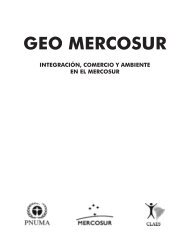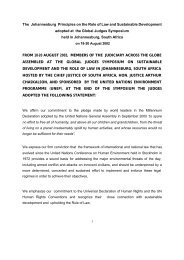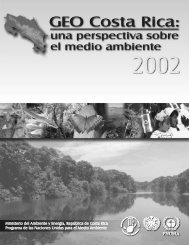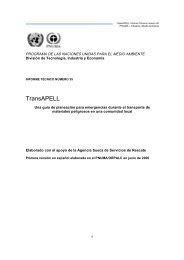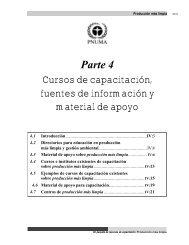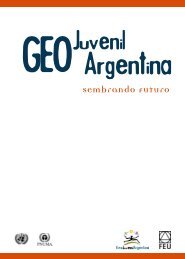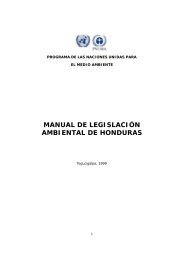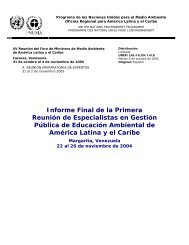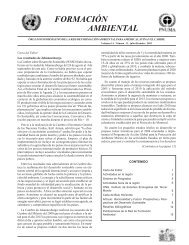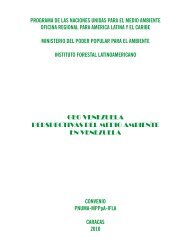English
English
English
You also want an ePaper? Increase the reach of your titles
YUMPU automatically turns print PDFs into web optimized ePapers that Google loves.
The main working areas are Occupational Health and Safety, cleaner production,<br />
sound agricultural practices, waste management, the implementation of the<br />
Globally Harmonized System of Classification and Labelling of Chemicals (GHS) and<br />
of the pollutant release and transfer register (PRTRs) including the creation of<br />
national and international registers, as well as the prevention of illegal traffic in<br />
toxic and dangerous goods<br />
What still needs to be done…<br />
Success of SAICM will depend on the commitment of the different stakeholders.<br />
Implementation is perhaps the biggest challenge facing SAICM – as for most, if<br />
not all, chemicals MEAs - along with funding needs. To this end, the development of<br />
national Strategic Approach implementation plans is the first important milestone..<br />
For trade unions, as for the rest of civil society organizations, it is essential to<br />
demand rights for effective participation in chemicals management forums at<br />
all levels of governance. In so doing, it also is necessary to collaborate with<br />
other stakeholders and to monitor and follow what governments, the private sector,<br />
and other interested parties are doing.<br />
Financial and technical resources are necessary for implementation. Indeed, a<br />
proper governmental allocation of expertise and capabilities, as well as an adequate,<br />
international funding mechanism are key to achieve objectives under SAICM.<br />
Box 3.3. What is the Intergovernmental Forum on Chemical Safety (IFCS)?<br />
The Intergovernmental Forum on Chemical Safety (IFCS) is a unique forum where<br />
governments, international, regional and national organizations, industry groups, public<br />
interest associations, labour organizations, scientific associations and representatives of<br />
civil society meet to discuss of international chemical policy issues and priorities.<br />
IFCS provides a forum for discussing issues of common interest and new and emerging<br />
issues in the area of sound management of chemicals.<br />
SAICM, substitution of hazardous chemical substances, nanomaterials and nanotechnology<br />
are some of the next issues generating interest and attention within IFCS.<br />
The functions of IFCS are consultative and advisory, and include :<br />
• Defining priorities for cooperative action and facilitating this cooperation;<br />
• Recommending concerted international strategies;<br />
• Helping strengthen national chemicals management coordination mechanisms;<br />
• Identifying gaps in scientific understanding;<br />
• Fostering information exchange and technical cooperation;<br />
• Reviewing effectiveness of relevant ongoing activities;<br />
• Advising governments in their work on chemical safety;<br />
• Promoting cooperation among governmental and nongovernmental organizations;<br />
• Evaluating progress on agreed actions and recommendations.<br />
Read more at: http://www.who.int/ifcs/en/<br />
Source: Intergovernmental Forum on Chemical Safety. “Global Partnerships for Chemical Safety”<br />
http://www.who.int/ifcs/en/<br />
Where to get more information?<br />
• Strategic Approach to International Chemical Management http://www.chem.unep.ch/saicm/<br />
120



